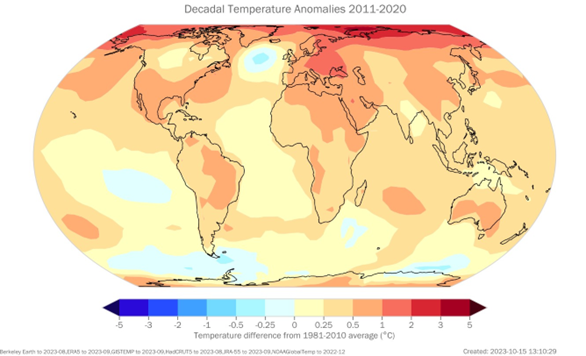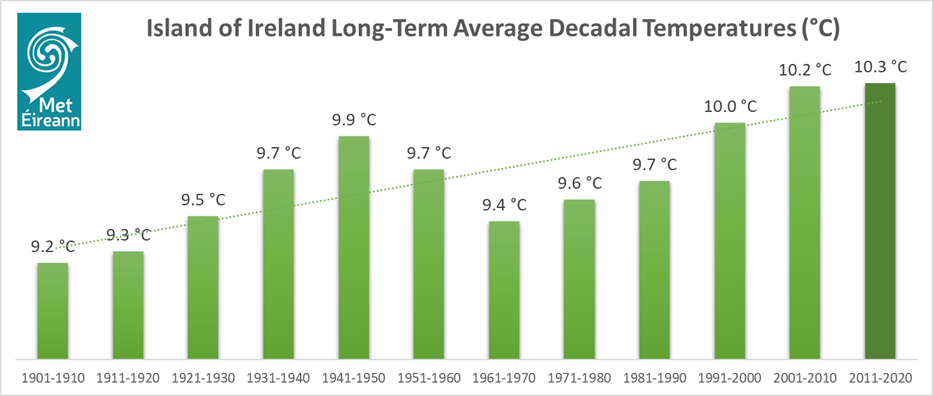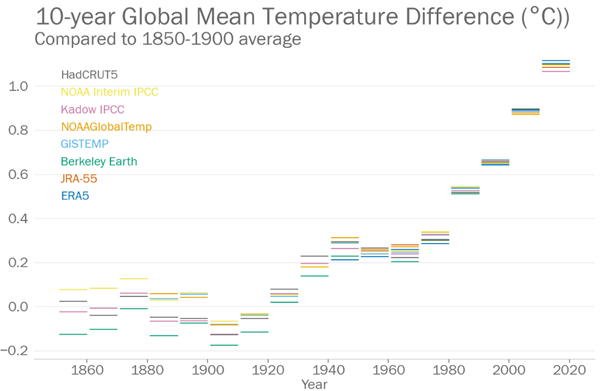Published on Tuesday 5 December 2023
The WMO today published the State of the Climate 2011-2020 report which looks at the global climate for the decade and places it in a longer-term climate context.
The report details the observed climate changes and how this differs from previous decades. Like the WMO Annual State of the Global Climate Reports, the decadal report combines input from National Meteorological and Hydrological Services (including from Ireland’s Met Éireann), regional climate centres, UN partners and leading climate scientists.
“Our ocean is warming faster and faster and the rate of sea level rise has nearly doubled in less than a generation. We are losing the race to save our melting glaciers and ice sheets,” said WMO Secretary-General Prof. Petteri Taalas.
The following points outline the key findings of the WMO Global Report and additional climatological on the findings for Ireland.
WMO State of the Climate 2011-2020 Report – Key Findings
- It was the warmest decade on record by a clear margin for both land and ocean.
- Global mean temperature for the period 2011-2020 was 1.10 ± 0.12 °C above the 1850-1900 average. This is based on the average of six data sets used by WMO. Figure 1 below maps the 2011-2020 anomalies (1981-2010 averages) globally.
- The warmest six years on record globally were between 2015 and 2020.
- Each successive decade since the 1990s has been warmer than all previous decades.
- The warmest years of the decade were 2016, because of a strong El Niño event, and 2020.
- More countries reported record high temperatures than in any other decade.
- Glacier and ice sheet loss unprecedented.
- Sea level rise accelerates.
- Ocean heat and acidification damage marine ecosystems.
- Extreme weather undermines sustainable development.
- Ozone layer on track to recovery.
- Virtually every attribution study carried out in 2011-2020 on heat found that the extreme heat increased significantly because of anthropogenic climate change.

Figure 1. Global Map of Decadal 2011-2020 Temperature Anomalies (1981-2010)
Ireland’s Temperatures 2011-2020 – Key Findings
Met Éireann’s Head of Climate Services, Keith Lambkin says “Ireland has experienced a remarkable decade driven by a global warming trend. While the warming of Ireland aligns with the global trend, it is not exactly the same. As the planet warms differently in different regions it is essential that we continue to observe, monitor and project this warming as it relates to Ireland.”
- 2011-2020 was warmest decade on record for Ireland also, marginally beating 2001-2010 the previous warmest decade. See figure 2 below, which illustrates the average decadal temperature in Ireland between 1901 and 2020.
- Ireland’s mean temperature for the period 2011-2020 was 10.26 ± 0.22 °C based on an average of datasets from five stations around Ireland and was 0.66 °C above the 20th century (1901-2000) annual average.
- Half of the six warmest years (between 1901 and 2020 inclusive) were from 2005.
- Each successive decade since 1991 has been warmer than all previous nine decades.
- The warmest years of the decade were 2017 and 2014.
- On Sunday 1 November 2015, the current highest November daily air temperature on record was observed at Dooks, Co Kerry with 20.1 °C which was 7.9 °C above its 1991-2020 long-term November average.

Figure 2. Island of Ireland Decadal Long-Term Temperatures (°C) 1901-2020 with linear trend line illustrating Ireland’s warming climate

Figure 3. WMO story map. At approximately 1.10° above the pre-industrial average (1850-1900), it was the warmest decade on record by a clear margin.
Notes:
- Read more at Rate and impact of climate change surges dramatically in 2011-2020 (5 December 2023).
- Read more on what we are expected for 2023 at Provisional State of the Irish Climate So Far.
WMO contact: Clare Nullis, Media Officer media@wmo.int, Cell: +41 79 709 13 97
Media enquiries: media@met.ie
Climate enquiries: enquiries@met.ie